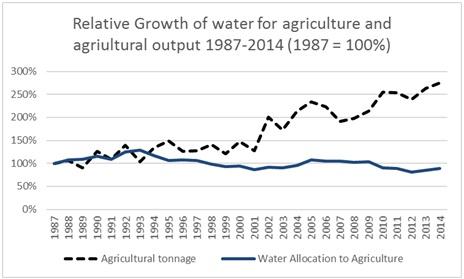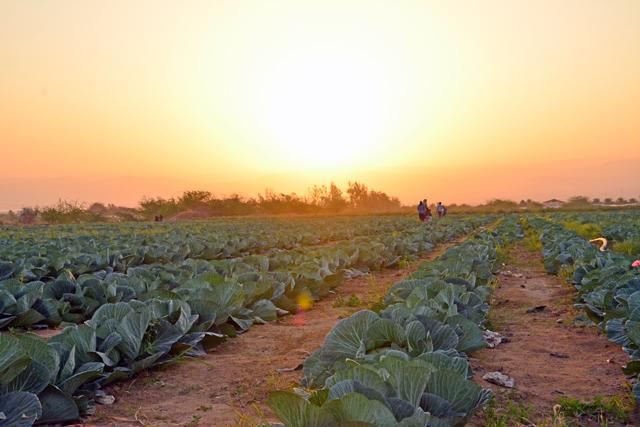You are here
Jordan can reduce agricultural water use by a third, research finds
By Hana Namrouqa - Mar 07,2017 - Last updated at Mar 07,2017

Trends in agricultural water use in Jordan 1987-2014, showing decoupling of agricultural output from water use in the mid-1990s (Courtesy of WANA)
AMMAN — Current crop production could be achieved with 30 per cent less use of agricultural water, according to the findings of new research.
An analysis on water and food security in Jordan indicated that there is potential for policies that reduce agricultural water needs, while still maintaining current levels of crop production.
The research is part of a project funded by the British Council and led by researchers at the University of Oxford’s Institute for Science, Innovation and Society, in partnership with the WANA Institute and EcoPeace.
The report said that while Jordan has already demonstrated considerable gains in agricultural water productivity, there is potential for further progress.
Focusing on ways to increase water productivity in the Kingdom, the research studied how other countries managed to increase their agricultural production without putting too much pressure on water resources, while exploring the potential for these methods to be applied in Jordan and Palestine.
The findings were shared on Tuesday during a session tackling new opportunities for Jordanian water security. Organisers noted that while the agriculture sector consumes the majority of water resources, its contribution to gross domestic product is low compared to other sectors.
Through the study of the Kingdom’s food import trends, the research suggested the possibility of strategically increasing imports of certain crops, without significantly impacting Jordan’s food security.
Researchers used data on agricultural production and water application to assess, as national averages, water needs per one tonne of food production, looking at 14 key crops including bananas, dates, olives and tomatoes, according to Michael Gilmont from Oxford University.
“Jordan could reduce its agricultural water use by up to 36 per cent. With efficiency alone and without reducing crop production, Jordan can reduce agricultural water use by 27 per cent,” according to the findings.
The analysis also showed that the current targets for treated-wastewater use in agriculture are approaching levels of regional best practices.
According to Water Ministry figures, the country’s 27 wastewater treatment plants treat 122 million cubic metres (mcm) of water per year; 115mcm of which are used for industrial purposes and the irrigation of certain crops, such as fodder.
Awni Kloub, director of Water Demand Management at the ministry, said the sector faces multiple challenges, including water scarcity in Jordan and decreasing rainfall, on which the Kingdom primarily relies, as well as the inefficiency of irrigation systems.
Another major challenge the water sector is facing is the rising cost of electricity.
“Electricity costs makes up around 50-60 per cent of the cost of one cubic metre of water that reaches consumers. Fourteen per cent of the country’s energy bill is paid by the Water Ministry,” Kloub said at the session.
He added that improving the efficiency of irrigation systems and better water management are vital to ensure the sustainability of the Kingdom’s depleting water resources.
Stakeholders in the project said that the report’s recommendations could form an important part of efforts to develop and improve Jordanian water security and economic opportunities.
Related Articles
AMMAN — The recent rainfall covering most parts of the Kingdom raised hopes of high productivity in the agriculture sector, according to exp
AMMAN — The contribution of Jordan’s agricultural sector to the national GDP has reached 30 per cent, according to President of the Jo
The Ministry of Water and Irrigation will construct a new wastewater pipeline in the first quarter of next year to transport sewage from Zarqa Governorate and parts of Amman to Al Samra Wastewater Treatment Plant, according to a government official.


















